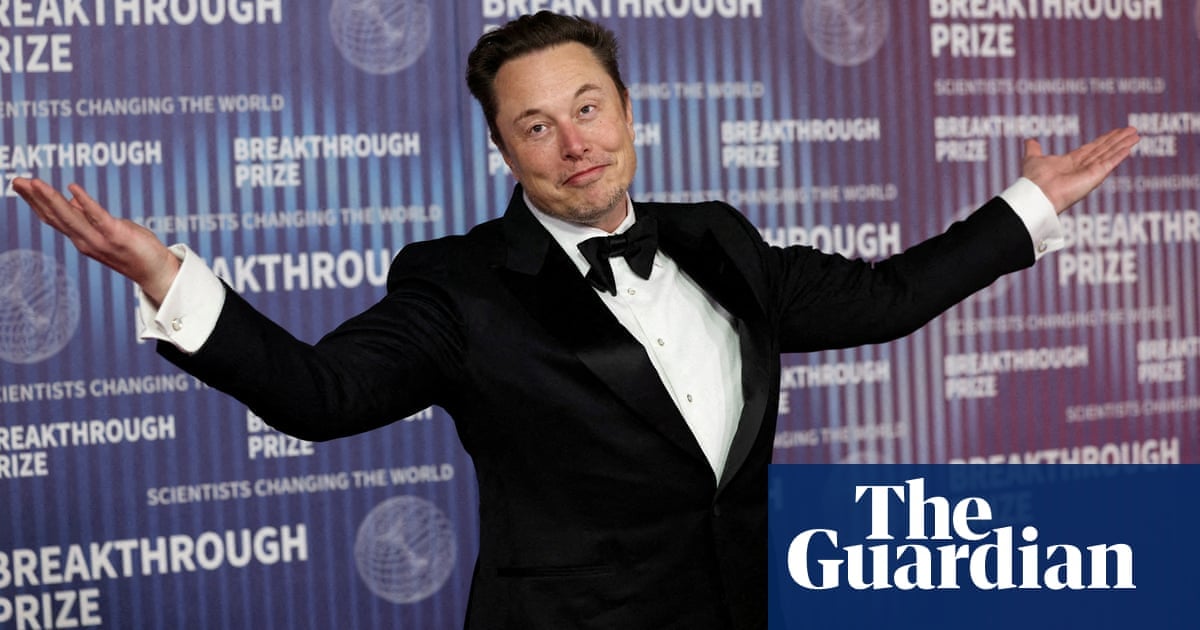- cross-posted to:
- aboringdystopia@lemmy.world
- cross-posted to:
- aboringdystopia@lemmy.world
Elon Musk is on pace to become the world’s first trillionaire by 2027, according to a new report from a group that tracks wealth.
Informa Connect Academy’s finding about the boss of electric carmaker Tesla, private rocket company SpaceX and social media platform X (formerly Twitter) stems from the fact that Musk’s wealth has been growing at an average annual rate of 110%. He was also the world’s richest person, with $251bn, according to the Bloomberg Billionaires Index, as the academy’s 2024 Trillion Dollar Club report began circulating Friday.
The academy’s analysis suggested business conglomerate founder Gautam Adani of India would become the second to achieve trillionaire status. That would reportedly happen in 2028 if his annual growth rate remains at 123%.



Why? If the fundamentals are there, there should be a hard floor on stock prices. It would take a while for the market to absorb that much Twitter and SpaceX, but I see no reason it’s impossible. Actually, I bet Twitter’s (off-book) cap would go up if Musk was leaving.
If you’re trying to defend capitalism (whatever that means to you), keep in mind that you’re basically suggesting stocks have no actual, intrinsic value here.
Billionaires don’t actually do this, though, because liquid cash doesn’t earn.
The S&P 500 is “worth” 45 trillion dollars.
The M2 money supply is less than half of that. There does not exist as money dollars to spend as the nominal value of all the stock.
The stock value is extrapolated from the shares that do move, but those extrapolations fall apart in the “cash it all out” scenario.
That being said, it just means we have to be careful about how we proceed. For example, better tax capture of loans and estates, which is a big dodge for people with high stock wealth.
Cashing out the entire S&P 500 is very different from cashing out one billionaire. Most of the people who buy stocks already own stuff on the S&P 500, so it’s unclear who that trade would be with, exactly. Same exact thing for real estate: if you sold the entire continental US (again, whatever that means) it would probably exceed 45 trillion, but I’m still pretty comfortable saying if you own 100 billion worth of Manhattan real estate, you actually have 100 billion dollars, and could reasonably pay a 90 billion dollar bill given enough time.
Careful is good when it comes to policy, I definitely agree with that.
Putting a huge percentage of a company up for sale on the open market is going to tank the price no matter what the fundamentals are. It’s simple supply and demand: you’re putting a huge glut of supply on the market and not putting similar demand. All those sell orders will begin expiring as the offers drop in price.
The largest owner of shares putting everything on the market at once is strong signal that the stock is overpriced and so buyers will react accordingly.
By the way, TSLA has a P/E ratio in the 60’s so it’s not exactly a great deal anyway.
I’m neither defending nor attacking capitalism. I’m just pointing out that putting heavy taxes on illiquid assets leads to huge disruptions.
The increase in value of shares above book is called unrealized gains. They can be here today and gone tomorrow. Taxing makes no sense unless you’re going to reimburse the taxes if the shares drop in price.
It’s not like you can buy too much of an earning stock. I’m pretty sure elasticity approaches zero quickly if someone is dumping a well-known, profitable company. It might induce some paranoia, but big investors don’t get to where they are by panicking often.
Depends. Amazon doesn’t even have one; tech stocks are often driven by future potential. I wouldn’t buy a car from them though.